| Listing 1 - 10 of 30 | << page >> |
Sort by
|
Book
ISBN: 023153602X 9780231536028 9780231164382 0231164386 Year: 2013 Publisher: New York, NY
Abstract | Keywords | Export | Availability | Bookmark
 Loading...
Loading...Choose an application
- Reference Manager
- EndNote
- RefWorks (Direct export to RefWorks)
Academic philosophy may have lost its audience, but the traditional subjects of philosophy-love, death, justice, knowledge, and faith-remain as compelling as ever. To reach a new generation, Paul W. Kahn argues that philosophy must take up these fundamental concerns as we find them in contemporary culture. He demonstrates how this can be achieved through a turn to popular film.Discussing such well-known movies as Forrest Gump (1994), The American President (1995), The Matrix (1999), Memento (2000), The History of Violence (2005), Gran Torino (2008), The Dark Knight (2008), The Road (2009), and Avatar (2009), Kahn explores powerful archetypes and their hold on us. His inquiry proceeds in two parts. First, he uses film to explore the nature of action and interpretation, arguing that narrative is the critical concept for understanding both. Second, he explores the narratives of politics, family, and faith as they appear in popular films. Engaging with genres as diverse as romantic comedy, slasher film, and pornography, Kahn explores the social imaginary through which we create and maintain a meaningful world. He finds in popular films a new setting for a philosophical inquiry into the timeless themes of sacrifice, innocence, rebirth, law, and love.
Book
ISBN: 086547138X 9780865471382 Year: 1984 Publisher: San Francisco North point press
Abstract | Keywords | Export | Availability | Bookmark
 Loading...
Loading...Choose an application
- Reference Manager
- EndNote
- RefWorks (Direct export to RefWorks)
Mongols --- Poetry --- Genghis Khan, --- Poetry.
Digital
ISBN: 9780231536028 9780231164382 Year: 2013 Publisher: New York, N.Y. Columbia University Press
Abstract | Keywords | Export | Availability | Bookmark
 Loading...
Loading...Choose an application
- Reference Manager
- EndNote
- RefWorks (Direct export to RefWorks)
Article
Year: 1959 Publisher: Berlin : Akademie-Verlag,
Abstract | Keywords | Export | Availability | Bookmark
 Loading...
Loading...Choose an application
- Reference Manager
- EndNote
- RefWorks (Direct export to RefWorks)
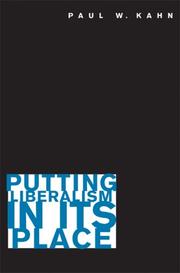
ISBN: 1282086839 9786612086830 1400826314 069113698X 0691120242 9781400826315 9781282086838 9780691136981 9780691120249 Year: 2005 Publisher: Princeton: Princeton university press,
Abstract | Keywords | Export | Availability | Bookmark
 Loading...
Loading...Choose an application
- Reference Manager
- EndNote
- RefWorks (Direct export to RefWorks)
In this wide-ranging interdisciplinary work, Paul W. Kahn argues that political order is founded not on contract but on sacrifice. Because liberalism is blind to sacrifice, it is unable to explain how the modern state has brought us to both the rule of law and the edge of nuclear annihilation. We can understand this modern condition only by recognizing that any political community, even a liberal one, is bound together by faith, love, and identity. Putting Liberalism in Its Place draws on philosophy, cultural theory, American constitutional law, religious and literary studies, and political psychology to advance political theory. It makes original contributions in all these fields. Not since Charles Taylor's The Sources of the Self has there been such an ambitious and sweeping examination of the deep structure of the modern conception of the self. Kahn shows that only when we move beyond liberalism's categories of reason and interest to a Judeo-Christian concept of love can we comprehend the modern self. Love is the foundation of a world of objective meaning, one form of which is the political community. Arguing from these insights, Kahn offers a new reading of the liberalism/communitarian debate, a genealogy of American liberalism, an exploration of the romantic and the pornographic, a new theory of the will, and a refoundation of political theory on the possibility of sacrifice. Approaching politics from the perspective of sacrifice allows us to understand the character of twentieth-century politics, which combined progress in the rule of law with massive slaughter for the state. Equally important, this work speaks to the most important political conflicts in the world today. It explains why American response to September 11 has taken the form of war, and why, for the most part, Europeans have been reluctant to follow the Americans in their pursuit of a violent, sacrificial politics. Kahn shows us that the United States has maintained a vibrant politics of modernity, while Europe is moving into a postmodern form of the political that has turned away from the idea of sacrifice. Together with its companion volume, Out of Eden, Putting Liberalism in Its Place finally answers Clifford Geertz's call for a political theology of modernity.
Communitarianism --- Liberalism --- Political culture --- Social contract. --- Social compact --- Consensus (Social sciences) --- Political science --- Sociology --- Sovereignty --- Liberal egalitarianism --- Liberty --- Social sciences --- Social structure --- Social contract --- Liberalism - United States --- Communitarianism - United States --- Political culture - United States
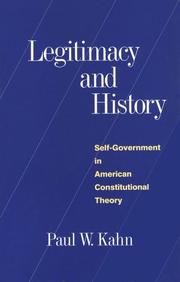
ISBN: 0300063075 9780300063073 Year: 1992 Publisher: New Haven Yale University Press
Abstract | Keywords | Export | Availability | Bookmark
 Loading...
Loading...Choose an application
- Reference Manager
- EndNote
- RefWorks (Direct export to RefWorks)
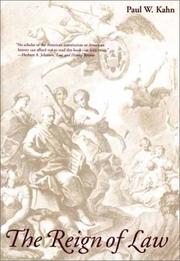
ISBN: 9780300083927 0300083920 Year: 1997 Publisher: New Haven Yale University Press
Abstract | Keywords | Export | Availability | Bookmark
 Loading...
Loading...Choose an application
- Reference Manager
- EndNote
- RefWorks (Direct export to RefWorks)
Jurisprudence --- Rule of law --- Law --- Political science --- Philosophy --- Administration --- Civil government --- Commonwealth, The --- Government --- Political theory --- Political thought --- Politics --- Science, Political --- Social sciences --- State, The
Book
ISBN: 9780300212082 0300212089 9780300220841 0300220847 Year: 2016 Publisher: New Haven
Abstract | Keywords | Export | Availability | Bookmark
 Loading...
Loading...Choose an application
- Reference Manager
- EndNote
- RefWorks (Direct export to RefWorks)
Writing in the tradition of Karl Llewellyn's classic The Bramble Bush, Paul Kahn speaks in this book simultaneously to students and scholars. Drawing on thirty years of teaching experience, Kahn introduces students to the deep, narrative structure of the judicial opinion. Learning to read the opinion, the student learns the nature of legal argument. Thus Kahn's exposition of the opinion simultaneously offers a theory of legal meaning that will be of great interest to scholars of law, humanities, and the social sciences. At the center of Kahn's approach are ideas of narrative, persuasion, and self-government. His sweeping account of interpretation in law offers innovative views of the nature of authorship, the development and decline of doctrine, and the construction of facts.
Judicial opinions --- Judicial process --- Legal composition --- Law --- Communication in law --- Practice of law --- Forms (Law) --- Authorship --- Editing --- Judicial opinions. --- Judicial process. --- Legal composition. --- Decision making, Judicial --- Judicial behavior --- Judicial decision making --- Judges --- Procedure (Law) --- Opinions, Judicial --- Legal opinions --- Psychological aspects --- Interpretation and construction --- United States. --- AB --- ABSh --- Ameerika Ühendriigid --- America (Republic) --- Amerika Birlăshmish Shtatlary --- Amerika Birlăşmi Ştatları --- Amerika Birlăşmiş Ştatları --- Amerika ka Kelenyalen Jamanaw --- Amerika Qūrama Shtattary --- Amerika Qŭshma Shtatlari --- Amerika Qushma Shtattary --- Amerika (Republic) --- Amerikai Egyesült Államok --- Amerikanʹ Veĭtʹsėndi͡avks Shtattn --- Amerikări Pĕrleshu̇llĕ Shtatsem --- Amerikas Forenede Stater --- Amerikayi Miatsʻyal Nahangner --- Ameriketako Estatu Batuak --- Amirika Carékat --- AQSh --- Ar. ha-B. --- Arhab --- Artsot ha-Berit --- Artzois Ha'bris --- Bí-kok --- Ē.P.A. --- EE.UU. --- Egyesült Államok --- ĒPA --- Estados Unidos --- Estados Unidos da América do Norte --- Estados Unidos de América --- Estaos Xuníos --- Estaos Xuníos d'América --- Estatos Unitos --- Estatos Unitos d'America --- Estats Units d'Amèrica --- Ètats-Unis d'Amèrica --- États-Unis d'Amérique --- Fareyniḳṭe Shṭaṭn --- Feriene Steaten --- Feriene Steaten fan Amearika --- Forente stater --- FS --- Hēnomenai Politeiai Amerikēs --- Hēnōmenes Politeies tēs Amerikēs --- Hiwsisayin Amerikayi Miatsʻeal Tērutʻiwnkʻ --- Istadus Unidus --- Jungtinės Amerikos valstybės --- Mei guo --- Mei-kuo --- Meiguo --- Mî-koet --- Miatsʻyal Nahangner --- Miguk --- Na Stàitean Aonaichte --- NSA --- S.U.A. --- SAD --- Saharat ʻAmērik --- SASht --- Severo-Amerikanskie Shtaty --- Severo-Amerikanskie Soedinennye Shtaty --- Si͡evero-Amerikanskīe Soedinennye Shtaty --- Sjedinjene Američke Države --- Soedinennye Shtaty Ameriki --- Soedinennye Shtaty Severnoĭ Ameriki --- Soedinennye Shtaty Si͡evernoĭ Ameriki --- Spojené obce severoamerick --- Spojené staty americk --- SShA --- Stadoù-Unanet Amerika --- Stáit Aontaithe Mheirice --- Stany Zjednoczone --- Stati Uniti --- Stati Uniti d'America --- Stâts Unîts --- Stâts Unîts di Americhe --- Steatyn Unnaneysit --- Steatyn Unnaneysit America --- SUA --- Sŭedineni amerikanski shtati --- Sŭedinenite shtati --- Tetã peteĩ reko Amérikagua --- U.S. --- U.S.A. --- United States of America --- Unol Daleithiau --- Unol Daleithiau America --- Unuiĝintaj Ŝtatoj de Ameriko --- US --- USA --- Usono --- Vaeinigte Staatn --- Vaeinigte Staatn vo Amerika --- Vereinigte Staaten --- Vereinigte Staaten von Amerika --- Verenigde State van Amerika --- Verenigde Staten --- VS --- VSA --- Wááshindoon Bikéyah Ałhidadiidzooígí --- Wilāyāt al-Muttaḥidah --- Wilāyāt al-Muttaḥidah al-Amirīkīyah --- Wilāyāt al-Muttaḥidah al-Amrīkīyah --- Yhdysvallat --- Yunaeted Stet --- Yunaeted Stet blong Amerika --- ZDA --- Združene države Amerike --- Zʹi͡ednani Derz͡havy Ameryky --- Zjadnośone staty Ameriki --- Zluchanyi͡a Shtaty Ameryki --- Zlucheni Derz͡havy --- ZSA --- ABŞ --- Amerikanʹ Veĭtʹsėndi͡avks Shtattnė --- É.-U. --- ÉU --- Saharat ʻAmērikā --- Spojené obce severoamerické --- Spojené staty americké --- Stáit Aontaithe Mheiriceá --- Wááshindoon Bikéyah Ałhidadiidzooígíí
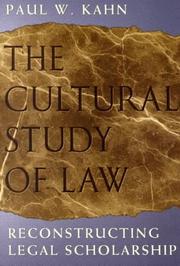
ISBN: 0226422550 9780226422558 0226422542 Year: 1999 Publisher: Chicago University of Chicago Press
Abstract | Keywords | Export | Availability | Bookmark
 Loading...
Loading...Choose an application
- Reference Manager
- EndNote
- RefWorks (Direct export to RefWorks)
Rule of law --- Culture and law --- Law --- Jurisprudence --- Law and culture --- Philosophy --- Culture and law. --- Philosophy.
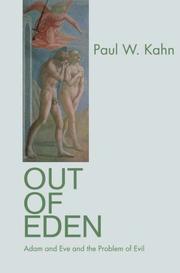
ISBN: 1282129708 9786612129704 1400827442 9781400827442 9781282129702 0691126933 9780691126937 0691148120 Year: 2007 Publisher: Princeton Princeton university press
Abstract | Keywords | Export | Availability | Bookmark
 Loading...
Loading...Choose an application
- Reference Manager
- EndNote
- RefWorks (Direct export to RefWorks)
"In Out of Eden, Paul Kahn offers a philosophical meditation on the problem of evil. He uses the Genesis story of the Fall as the starting point for a profound articulation of the human condition. Kahn shows us that evil expresses the rage of a subject who knows both that he is an image of an infinite God and that he must die. Kahn's interpretation of Genesis leads him to inquiries into a variety of modern forms of evil, including slavery, torture, and genocide."--BOOK JACKET.
Good and evil. --- Evil --- Wickedness --- Ethics --- Philosophy --- Polarity --- Religious thought --- Good and evil --- 216 --- Goed en kwaad --- Eden. --- Garden of Eden --- Paradise
| Listing 1 - 10 of 30 | << page >> |
Sort by
|

 Search
Search Feedback
Feedback About UniCat
About UniCat  Help
Help News
News